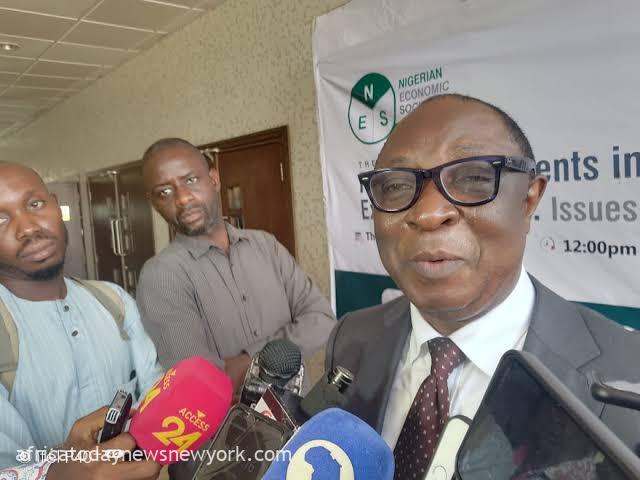Professor of Economics, Sam Olofin, issued a warning regarding the precarious position of the Nigerian currency (Naira), urging decisive action to safeguard against potential collapse driven by influential entities in the foreign exchange market.
Addressing attendees as the guest speaker at the 2024 public lecture hosted by the Nigerian Economic Society, themed “Recent Developments In The Nigerian Foreign Exchange Market: Issues, Options and the Path Ahead,” held at the CBN Centre of Excellence Lecture Theatre in the capital city of Oyo State, University of Ibadan, Sam Olofin delivered his remarks.
He said, ‘If the naira must be saved from imminent collapse, the time has come to rescue it from the hands of these powerful operators in the foreign exchange market. The time has come like it is in other countries that believe in the rule of law, to define what is legal and distinguish such from what is criminal.’
Read also: CBN Working To strengthen Naira – Cardoso Assures Nigerians
‘The time has come like it is in other countries that believe in the rule of law, to define what is legal and distinguished such from what is criminal. Have criminals been apprehended and made to face severe consequences for their actions?’
‘As things stand at the moment, merely wishing that the ‘willing buyer and willing seller’ model would do the job would be a mere fantasy. The fact is that the parallel market powerful operators are not ghosts.’
‘Without sounding too simplistic or offering a silver bullet that would solve the seemingly complex problems in the foreign exchange market, our attention should be focused on this powerful segment of the market, the so-called parallel of black market.’
‘We have succeeded either deliberately or unwittingly, in creating a monster that has been well protected. It is ruthless and hardly cares about anything else other than its selfish profit motive. It is either we bring this monster under control or allow it to strangulate the naira.’
In his opening remarks, Adeola Adenikinju, President of the NES, underscored the relevance of the chosen theme, stating that it addresses what is arguably the paramount concern in Nigeria at present.
Additionally, Adenikinju pointed out that the subject of foreign exchange falls squarely within the realm of economics, highlighting that the exchange rate functions as a fundamental price.
‘However, for an import-dependent economy like ours, it is a price that influences other prices in the economy-products, money, and factor markets. The spike in inflation in the last few months in particular has been largely driven by the exchange rate. The pass-through effect from the exchange rate to other prices is quite high.’
He mentioned that the government, particularly the CBN, had responded to the sharp and persistent devaluation of the naira with a series of circular policies. He expressed concern that sometimes the effects of a specific policy had not been evaluated before others were swiftly introduced.
He noted that this approach tended to increase uncertainty and the flight to safety tendencies of economic agents, who persisted in holding dollars outside the banking system.
Among the dignitaries were Central Bank of Nigeria Governor, Olayemi Cardoso; Special Adviser to the President on Economic Affairs, Tope Fasua; Director General, NISER, Antonio Simbine; Vice Chancellor, University of Ibadan, Kayode Adebowale; among others.

